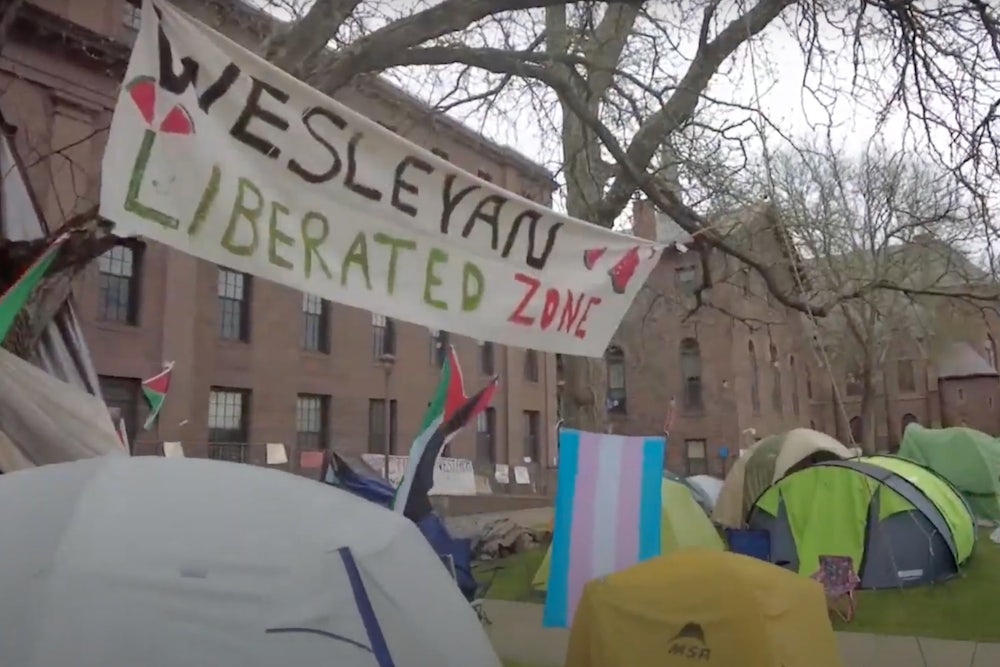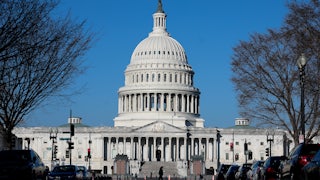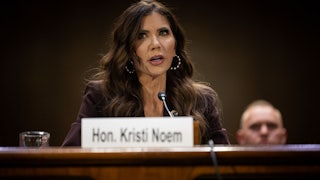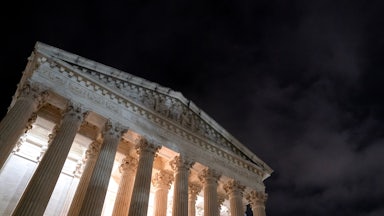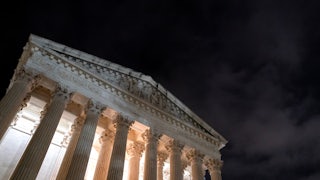The encampment at Wesleyan University went up on the night of Sunday, April 28, during a planned rally in support of Palestinians. At the time, I was in an open meeting called by the student government to answer questions about how the university invests its endowment but also about many other topics—from labor issues at a construction site to whether there could be a nonbinary entrance to the swimming pool. But the energy in the room was about the war in Gaza and what Wesleyan could do in reaction to it.
The students were well aware that I’d already gone on record—several times in print—with respect to Gaza since the heinous terrorist attacks of October 7. On that day I wrote about Hamas’s “sickening violence” against Israel, and since then I have written about the dangers of antisemitism and Islamophobia at home and about the loss of innocent life in Gaza. So I can’t argue that university leaders should keep quiet or say something evasive about “principled neutrality.” Indeed, the students reminded me of a phrase I’d used: “Neutrality is complicity.” Although I am one of the only American university presidents to call for a cease-fire in Gaza, the students in the meeting did not find that nearly enough. Mere words, they told me, are just another form of neutrality. They accused me of trying to hide behind them. And outside the chants grew louder: “Roth, Roth, you can’t hide / you can’t hide from genocide.” When I walked home, an angry crowd of maybe 75 followed close behind.
By Monday morning there were a couple dozen tents set up. Students were careful not to block exits and entrances to campus buildings, and they made sure that the pathways through their encampment were clear. They were claiming territory for their protest, but they were not attempting to close it off. This was important for everyone. For the protesters, it was a sign that they wanted to spread their message to others, and also that they were open to discussing their objectives with anyone who wanted to talk. For me and my administrative colleagues, it was important because one of the reasons encampments are not normally permitted is that they mark off public areas for exclusive use, thereby denying others the opportunity to use that part of campus. Sure, the area was now dominated by signs bearing very specific and sometimes aggressive messages—among them, slogans about genocide and freeing Palestine that were off-putting to many on campus, including myself. (There were no signs demanding the return of the hostages kidnapped from kibbutz.) But this is a protest directed at the administration, and I don’t get to choose the protesters’ messages. I do want to pay attention to them.
We could have immediately closed down the encampment because the protesters hadn’t gotten advance permission for tents, and because they were writing messages on the adjacent buildings in chalk. Over the last week I’ve gotten many notes from alumni, parents, and strangers chastising me for not making the protesters “pay a price” for breaking the rules. In my initial message to the broad university community, I wrote: “The students [in the encampment] know that they are in violation of university rules and seem willing to accept the consequences.” So why haven’t I made them feel those consequences? Cops don’t always give people tickets for going a few miles over the speed limit. Context matters, whatever Republican Congresswoman Elise Stefanik says. In this case, I knew the students were part of a broad protest movement, and protest movements often put a strain on an institution’s rules. They are meant to do that. The encampment was “non-violent and has not disrupted normal campus operations,” I wrote, and “as long as it continues in this way, the University will not attempt to clear the encampment.” I added that we would “not tolerate intimidation or harassment of students, staff, or faculty,” and that the protesters, as far as I could tell, were not moving in that direction.
The encampment is just beneath my office window, and many times during the last several days I’ve looked over to see what was happening: mostly students and the occasional faculty member engaged in casual conversation, and occasionally animated debate. I’ve written that being a student in the West has come to mean “practicing freedom,” and I was reminded of that as I looked at these young people expressing their political concerns. There were drawings and flags, and a sense of a community. Between classes and during mealtimes, there have been many people just passing through. Some stop to talk, others just amble along. I myself have walked through every day I’m on campus, and notwithstanding hostility from more than a few protesters (“Why are you unwilling to support divestment?!”), I stop to talk to students I know from my classes or say hello to those I don’t know. One day I bumped into the campus rabbi there, and we talked for a while until the leader of a Black music collective on campus happened by and told me about his senior recital.
The encampment, now grown to roughly 50 tents, may be fostering a sense of community among protesters, but it hasn’t been kumbaya for everyone. Several Jewish students were outraged by the messages about genocide and freeing Palestine. Did this mean freeing the region from Jews? The expressions “Globalize the Intifada,” “Glory to the Martyrs,” and “Terror is justified as long as Palestine is occupied” indicated toleration if not support of Hamas, an organization that justifies raping women and killing babies as long as you call them Jewish settlers. A few students showed up with an Israeli flag and were shamed on social media. Their counterprotest didn’t result in productive conversation, alas. But it didn’t spill into violence either, and my team did its best to make sure that was the case.
I’ve checked in with many Jewish students individually and sat down with a group to talk about their fears—and their complaints about faculty bias. Amazingly to them and to me, a few professors took votes in their classes to decide whether they should hold class in the encampment. Minority rights? Not something these faculty seemed concerned with, at least not until the provost reminded them that they could not force any student to support a cause with which the professor happened to agree. Of course, faculty are free to support any cause they like, but whatever political acumen they believe themselves to possess, they are not free to impose this on their students. The Jewish students opposed to the protesters seemed glad to be able to talk openly about their concerns. I emphasized to them that I could not protect them from opposing views but that I could protect their safety and capacity to pursue their education.
There was some graffiti vandalism after the encampment settled in, and we let people know that if that continued, the university would have to step in. Fortunately, that didn’t continue, and so far, almost all the protesters seem eager to find a constructive path: to make their arguments about divestment and about boycotts. They know that I have long been on record opposing these arguments, but I will try to listen to them with an open mind. Ultimately, it is the Board of Trustees that will decide about investment policy. Myself, I am eager to find ways of supporting Gazan relief efforts, and of doing whatever we can to promote a sustainable peace in the region that would acknowledge the rights of all parties. I’d like to think students know that.
I have watched with sadness the police actions on some campuses, as well as the lack of police action in Los Angeles when an encampment was attacked by counterprotesters. I can well imagine that for most university presidents, calling in the police is the last resort. I too have depended on the law enforcement in the past, most heartbreakingly when a student was murdered on campus many years ago. I will certainly ask for police help if I need it to protect people, property, or university operations from criminal behavior.
It’s almost the end of the school year, and more than once I’ve been asked, “Don’t I wish we had just made it through a couple of more weeks without incident?” Mostly … no. How can I not respect students for paying attention to things that matter so much? I respect that they’re concerned about Gaza; I admire that they’re not entirely taken up with grades or lining up their credentials. Will their protest help? My fear is that such protests (especially when they turn violent) in the end will help the reactionary forces of populist authoritarianism. I also think student protesters are wrong to focus on university investments. I would prefer they use their energies to pressure the U.S. government to do more to get the hostages released, to stop supporting Israeli Prime Minister Benjamin Netanyahu’s war tactics, and to bring more direct aid to people in Gaza on the brink of starvation. My team expects to discuss all of this with students in the coming days. Right now, I’m most concerned with protecting their right to protest in nonviolent ways that don’t undermine our educational program. For me, the modest violations of the rules are preferable to the narrow-minded vocationalism that others seem suddenly to pine for.
I share this view of the moment with some trepidation. It only takes a few jerks to turn a peaceful protest into a violent confrontation. But I also share this with hope that we will all learn something from this experience—whether or not we are sleeping in a tent.
